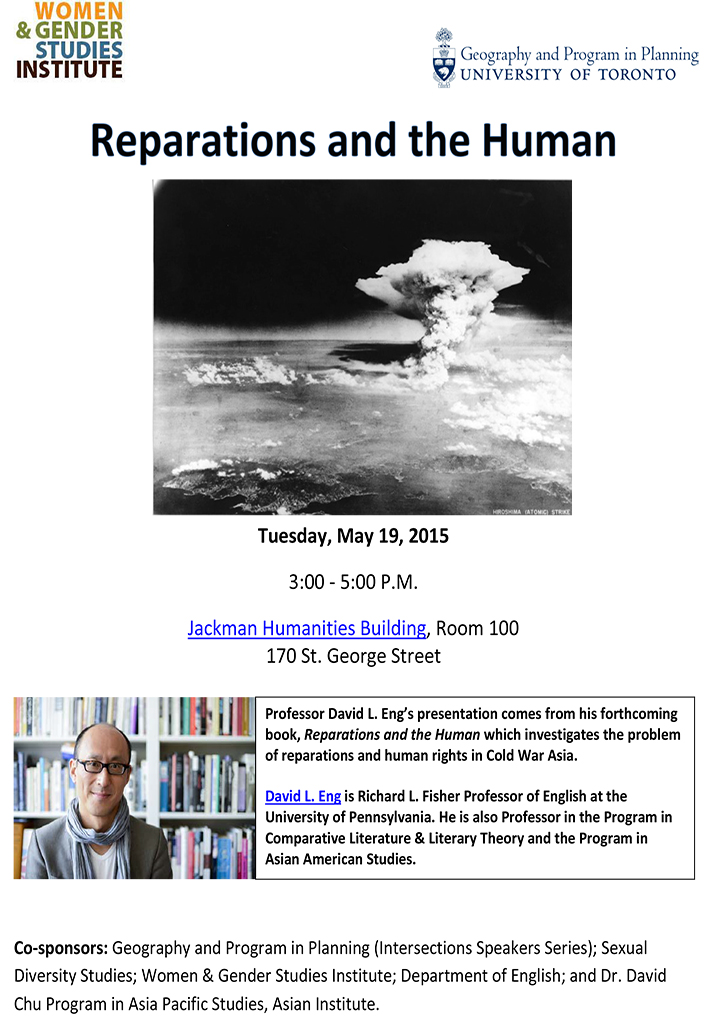« All Events
David L. Eng – Reparations and the Human
May 19, 2015 @ 3:00 pm - 5:00 pm

This presentation comes from my forthcoming book, Reparations and the Human, which investigates the problem of reparations and human rights in Cold War Asia. Following the devastating violence of World War II, an emerging discourse of reparations and human rights sought to articulate new precepts against state harm of individuals. Traditionally, reparations could be claimed by one state from another as compensation for the “costs of war.” For the first time, however, the idea of reparations was extended to encompass individual and group claims for redress for state-sponsored violence in the name of human rights and in the interests of protecting the sanctity of human life.
My approach to the topic is fundamentally interdisciplinary. Reparation is a key term in political theory, but it is also a central concept in psychoanalysis specifically, object relations yet the two are rarely discussed in relation to one another. Reparations and the Human focuses on unexamined links between political and psychic genealogies of reparation in order to explore the possibilities and limits of repairing the injuries of war, violence, and colonialism in the Transpacific region. Here, I investigate three interlocking events: the internment of Japanese Americans during WWII; the atomic bombings of Hiroshima and Nagasaki ending that war; and contemporary legal claims of “Comfort Women,” girls and women conscripted by the Japanese Imperial Army into sexual slavery.
From this larger perspective, I analyze the postwar ascension of reparations and human rights not only as a moral response to but also, and indeed, as a form of continued state violence.
In this talk, I focus specifically on the afterword to my book, “Absolute Apology, Absolute Forgiveness,” which explores the history of uranium mining and “Little Boy,” the atomic bomb detonated by the U.S. military over Hiroshima on August 6, 1945. Much of the world¹s uranium supply is mined from indigenous lands, and the uranium for Little Boy, too, came in part from the lands of the Sahtu Dene, an indigenous people in Great Bear Lake, Canada. Ignorant at the time of how their mining efforts would be applied and the destination of the ore, the Sahtu Dene nonetheless felt implicated once they learned of Hiroshima¹s fate. In response to the disaster, they sent a delegation to Hiroshima to apologize. I will discuss the Sahtu Dene’s response to the atomic bombing in order to propose an alternate concept for reparations and the human. Here, I extend Jacques Derrida¹s notion of “absolute forgiveness” to develop a corollary concept: “absolute apology.”
David L. Eng is Richard L. Fisher Professor of English at the University of Pennsylvania. He is also Professor in the Program in Comparative Literature & Literary Theory and the Program in Asian American Studies.
Eng is author of The Feeling of Kinship: Queer Liberalism and the Racialization of Intimacy (Duke, 2010) and Racial Castration: Managing Masculinity in Asian America (Duke, 2001). He is co-editor with David Kazanjian of Loss: The Politics of Mourning (California, 2003) and with Alice Y. Hom of Q & A: Queer in Asian America (Temple, 1998). In addition, he is co-editor of two special issues of the journal Social Text: with Teemu Ruskola and Shuang Shen, “China and the Human” (2011/2012), and with Judith Halberstam and José Esteben Muñoz, “What’s Queer about Queer Studies Now?” (2005). His current book project, Reparations and the Human, investigates the relationship between political and psychic genealogies of reparations in Cold War Asia. Eng is the recipient of research fellowships from the Institute for Advanced Study in Princeton and the Mellon Foundation, among others. Last year, he helped to organize a Penn Mellon Sawyer Seminar on “Race, Across Time and Space,” focusing on race as a fungible yet persistent feature of human history and as a global phenomenon with long and diverse histories.

